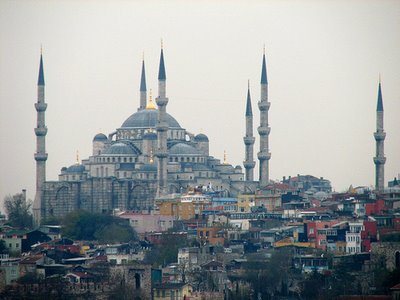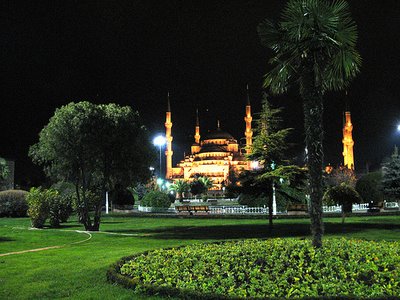
From Joshua Trevino at the Brussels Journal:
Pope And Patriarch Join Hands
Two hours ago, Pope Benedict XVI and Patriarch Bartholomew I celebrated the Liturgy of St John Chrysostom in the Patriarchal chapel in Istanbul. They then emerged into the sunlight, joined hands and proclaimed their goal of a reunified Church. I was there for both -- and here is my photograph of this incredible event.
That was yesterday, more on this event today:
Under the Turkish Guns, the Christians Roar
[...] Bartholomew ascends to the iconostasis and welcomes Benedict in Greek. Benedict, aware of the cameras surrounding him, replies in English. We must, he says, recall Europe to its Christian heritage before it is too late – and we must do it together. Then they emerge into the cold sunlight of a cold day. They ascend to a balcony overlooking the courtyard where we gather in expectation. They speak briefly. And then, they clasp hands, Pope and Patriarch, smile and raise their arms together. Tears come to my eyes, and I am shocked to see several media personnel crying openly. For an instant, the Church is one. For a shadow of a second, the dreams of Christendom are again real.
Read the whole thing, for some interesting observations about the Turkish police, who are both protecting and "containing" the Christians. In fact many of Joshua's posts go into detail about the Turkish governments restrictions on Christians, and how they are contained, and the reasoning and historical predjudices behind it all.
Johsua has done several posts at the Brussels journal blog covering the Papal visit to Turkey. There is so much history, so much to understand. Here are some links to just a few of his posts, with some excerpts (bold emphasis mine):
A Stillness in Halki
[...] In an interview we had with Australian radio this morning, Robert Moynihan mentioned that all of European history is a nostalgia for Rome. He meant the Roman Empire – I don't know if the insight is his – and it occurred to me that the remains of Constantinople reflect this rather well. The barbarians who ended antiquity emerged from the same formless steppe as the Turks, and like the Turks, they sought to be worthy, in their way, of the heritage of their conquests. If we conceive of the Turks as the last eruption of the barbarians who ended the old Empires – in their case, the last vestige of Imperial Rome – then their modern predicament becomes more comprehensible. In watching the Turks seek to become European (even as Europeans strip the word of any meaning), one recalls Germanic and Gothic rulers seeking to be worthy of their concept of Roman culture. [...]

The Loyal Opposition
[...] Kemal Kerincsiz is a sort of archetype of the fanatical nationalism which undergirds the Kemalist state in Turkey. He is well-known as a nationalist gadfly, especially in his role as chief of an ultra-nationalist lawyers' union who has made it his mission to bring Turkish writers to trial. The latest example was that of Elif Shafak, who apparently wrote something a bit too sympathetic to Armenians in one of her fictional works; Kerincsiz swiftly brought her to trial under the notorious Article 301 of the Turkish Penal Code. The Article renders citizens liable for "insulting Turkishness," a vague enough crime, and one that has allowed Kerincsiz to haul nearly forty writers into court -- including Nobel Prize winner Orhan Pamuk. As he says, "We are right to prosecute these cases ... In our culture, no-one can brand their ancestors murderers. Maybe in the West they are more tolerant, but here we can't accept those comments as criticism." The concern for Turkish integrity goes beyond the literary realm. Kerincsiz held forth to Time Magazine last year on his mistrust of Europeans in particular: "History taught us that we cannot trust these Europeans ... Look at what happened in 1920: they divided up the Ottoman Empire, even though they had pledged not to do that. People call us paranoid, but we're not."[...]

Bardakoglu: Turkish for Chutzpah
[...] Reuters reports today that Ali Bardakoglu, chief of the Turkish Directorate-General for Religious Affairs, has requested that Pope Benedict XVI explicitly declare Islam to be peaceful: "I think the attitude the Pope should take is that neither Islam nor Christianity is a source of violence." Of course, the Pope does not take this attitude toward his own faith -- see his august predecessor's famous "Day of Pardon" during the Millennial Jubilee -- and there is little rational reason to think thus of Islam. (See, for starters, the Muslim reaction to the Pope's Regensburg remarks; to say nothing of the 9/11 and 7/7 attacks, for which I was present in New York and London respectively.) Bardakoglu's stated desire that the Pope should participate in a propaganda exercise is sadly typical, and profoundly ironic, given the source.
That fact is that Ali Bardakoglu was a rather prominent voice of Muslim indignation following the Pope's Regensburg address. He is on record as accusing the Pope of having an "attitude, which fuels division and lack of mutual trust, [that] is seriously threatening world peace," presumably by inciting Muslims to burn churches, kill priests, etc. He has declared that the Pope harbors a "subconscious Crusader mentality" that is "disrespectful" and "hostile." He has announced that the Pope has a "grudge in his heart" toward Muhammed, and that he does "not think any good will come from a visit to the Muslim world by a person who has such ideas about Islam's prophet." He has stated that the Pope represents an "abhorrent, hostile and prejudiced point of view" toward Islam.
Now, presumably, Benedict XVI is supposed to accede to this man's request for his preferred whitewash of Islam. Bardakoglu may or may not see any irony in this; what is certain is that trafficking in propaganda is part of his stock in trade. [...]
While this sounds merely critical of Turkey, it's more complicated than that. As you read more, you start to understand the forces and predjudices at work here, and how some sort of balance is trying to be achieved. It's difficult. Turkey is in so many ways a crossroads for Eastern and Western culture, and it's often an uneasy mix.
The photos in this post are Joshua's. There is a link below to more of them that he has made available on flickr.com.
Related Links:
From Tracy Wilkinson, LA Times staff reporter:
A tense time for a papal visit
Good commentary from the LA Times, explaining some of the tensions at work in this visit.
Pope and Patriarch
Website devoted to the Pope's visit with the Patriarch.
Joshua Trevino's Photos
He has lots of photos that he has made available at flickr.com.
Hagia Sofia, Christendom's Lost Church
My post from yesterday.
No comments:
Post a Comment